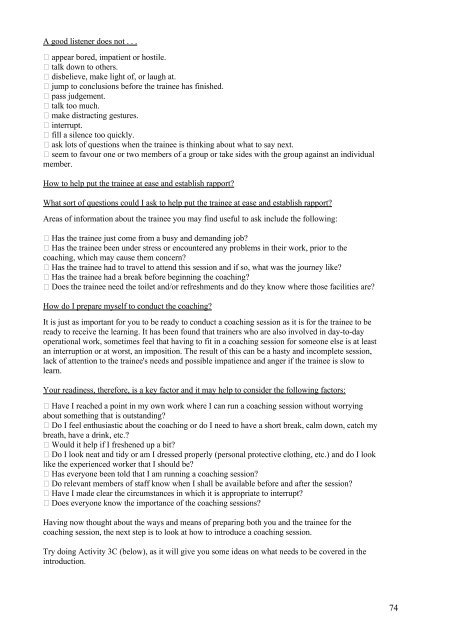How to Perform On-the-job Training - Dean Amory
According to The Encyclopedia of Business, ©2000 Gale Cengage, On-the-job training is by far the predominant form of job training. Studies also indicate that it is the most effective form of job training. Yet, it also represents a significant investment considering that roughly 30% of a new worker's time is spent in on-the-job training during the first 90 days of employment, that productivity of experienced workers assigned to train new workers may decrease during the training period, and that new workers may make expensive mistakes. Both companies and workers therefore profit largely from the presence of simple, but complete trainee and trainer guides that allow for executing OJT in a structured way. “How to perform on-the-job training”, has the information, techniques and tips that will allow you to implement a professional OJT training program. The book also includes all the tools, documents and checklists necessary for setting up a qualitative and efficient skills training program for OJT coaches
According to The Encyclopedia of Business, ©2000 Gale Cengage, On-the-job training is by far the predominant form of job training. Studies also indicate that it is the most effective form of job training. Yet, it also represents a significant investment considering that roughly 30% of a new worker's time is spent in on-the-job training during the first 90 days of employment, that productivity of experienced workers assigned to train new workers may decrease during the training period, and that new workers may make expensive mistakes.
Both companies and workers therefore profit largely from the presence of simple, but complete trainee and trainer guides that allow for executing OJT in a structured way.
“How to perform on-the-job training”, has the information, techniques and tips that will allow you to implement a professional OJT training program. The book also includes all the tools, documents and checklists necessary for setting up a qualitative and efficient skills training program for OJT coaches
Create successful ePaper yourself
Turn your PDF publications into a flip-book with our unique Google optimized e-Paper software.
A good listener does not . . .<br />
appear bored, impatient or hostile.<br />
talk down <strong>to</strong> o<strong>the</strong>rs.<br />
disbelieve, make light of, or laugh at.<br />
jump <strong>to</strong> conclusions before <strong>the</strong> trainee has finished.<br />
pass judgement.<br />
talk <strong>to</strong>o much.<br />
make distracting gestures.<br />
interrupt.<br />
fill a silence <strong>to</strong>o quickly.<br />
ask lots of questions when <strong>the</strong> trainee is thinking about what <strong>to</strong> say next.<br />
seem <strong>to</strong> favour one or two members of a group or take sides with <strong>the</strong> group against an individual<br />
member.<br />
<strong>How</strong> <strong>to</strong> help put <strong>the</strong> trainee at ease and establish rapport?<br />
What sort of questions could I ask <strong>to</strong> help put <strong>the</strong> trainee at ease and establish rapport?<br />
Areas of information about <strong>the</strong> trainee you may find useful <strong>to</strong> ask include <strong>the</strong> following:<br />
Has <strong>the</strong> trainee just come from a busy and demanding <strong>job</strong>?<br />
Has <strong>the</strong> trainee been under stress or encountered any problems in <strong>the</strong>ir work, prior <strong>to</strong> <strong>the</strong><br />
coaching, which may cause <strong>the</strong>m concern?<br />
Has <strong>the</strong> trainee had <strong>to</strong> travel <strong>to</strong> attend this session and if so, what was <strong>the</strong> journey like?<br />
Has <strong>the</strong> trainee had a break before beginning <strong>the</strong> coaching?<br />
Does <strong>the</strong> trainee need <strong>the</strong> <strong>to</strong>ilet and/or refreshments and do <strong>the</strong>y know where those facilities are?<br />
<strong>How</strong> do I prepare myself <strong>to</strong> conduct <strong>the</strong> coaching?<br />
It is just as important for you <strong>to</strong> be ready <strong>to</strong> conduct a coaching session as it is for <strong>the</strong> trainee <strong>to</strong> be<br />
ready <strong>to</strong> receive <strong>the</strong> learning. It has been found that trainers who are also involved in day-<strong>to</strong>-day<br />
operational work, sometimes feel that having <strong>to</strong> fit in a coaching session for someone else is at least<br />
an interruption or at worst, an imposition. The result of this can be a hasty and incomplete session,<br />
lack of attention <strong>to</strong> <strong>the</strong> trainee's needs and possible impatience and anger if <strong>the</strong> trainee is slow <strong>to</strong><br />
learn.<br />
Your readiness, <strong>the</strong>refore, is a key fac<strong>to</strong>r and it may help <strong>to</strong> consider <strong>the</strong> following fac<strong>to</strong>rs:<br />
Have I reached a point in my own work where I can run a coaching session without worrying<br />
about something that is outstanding?<br />
Do I feel enthusiastic about <strong>the</strong> coaching or do I need <strong>to</strong> have a short break, calm down, catch my<br />
breath, have a drink, etc.?<br />
Would it help if I freshened up a bit?<br />
Do I look neat and tidy or am I dressed properly (personal protective clothing, etc.) and do I look<br />
like <strong>the</strong> experienced worker that I should be?<br />
Has everyone been <strong>to</strong>ld that I am running a coaching session?<br />
Do relevant members of staff know when I shall be available before and after <strong>the</strong> session?<br />
Have I made clear <strong>the</strong> circumstances in which it is appropriate <strong>to</strong> interrupt?<br />
Does everyone know <strong>the</strong> importance of <strong>the</strong> coaching sessions?<br />
Having now thought about <strong>the</strong> ways and means of preparing both you and <strong>the</strong> trainee for <strong>the</strong><br />
coaching session, <strong>the</strong> next step is <strong>to</strong> look at how <strong>to</strong> introduce a coaching session.<br />
Try doing Activity 3C (below), as it will give you some ideas on what needs <strong>to</strong> be covered in <strong>the</strong><br />
introduction.<br />
74


















